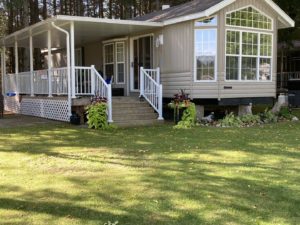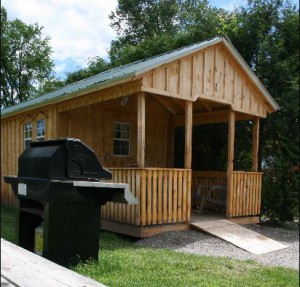The information on this page is the personal opinion of the author and has no legal standing. For legal information contact a lawyer.
Why I think the RTA DOES Apply to permanent living facilities on a leased site in a Seasonal Recreational Park.
Example Conditions(Land Lease Home in a Land Lease Community)
- The Living Accommodation of this Example Facility is a Park Model Trailer with an attached Sun Room & Deck owned by the Tenant.
- The Site of this Facility is Leased on an Annual Basis as of May 1 every year for the Park’s Operational Season.
- The Facility is located in a Seasonal Park that is closed from Oct to May. Water and Power are Off. Day Access Only.
- Rent for a trailer to occupy a site( Perennially) for the whole- Year May1 to April 30 is comprised of a Seasonal Fee and a Winter Storage Fee.
- The Tenant is required to maintain insurance on the trailer over the winter to provide protection from winter damage from ice and falling tree branches.
- The Tenant has been on the same site for several years.(Perennial)
- MPAC has assessed the site and the tenant is required to pay residential Taxes.
Definitions
Rules Used By the LTB
Exemptions from Act (RTA)
- This Act does not apply with respect to,
(a) living accommodation intended to be provided to the travelling or vacationing public or occupied for a seasonal or temporary period in a hotel, motel or motor hotel, resort, lodge, tourist camp, cottage or cabin establishment, inn, campground, trailer park, tourist home, bed and breakfast vacation establishment or vacation home;
Findings of Board
- (1) In making findings on an application, the Board shall ascertain the real substance of all transactions and activities relating to a residential complex or a rental unit and the good faith of the participants and in doing so,
(a) may disregard the outward form of a transaction or the separate corporate existence of participants; and
ie: Disregard Lease Conditions
(b) may have regard to the pattern of activities relating to the residential complex or the rental unit. 2006, c. 17, s. 202.
ie: Tenant Activities:
- Pays Rent
- Has a lease or license of occupation
- Lives in the Accommodations
- Maintains the property,( Garden and Grass)
- Makes use of the common facilities provided by the park
- Participates in community activities
- Pays for Hydro according to readings on a Hydro Meter at the end of the season.
Summary Why RTA Does Apply to Land Lease Homes)
- The Decision in Putnam v. Grand River Conservation Authority, 2006 states that the 5(a) exclusion is applicable only to living accommodations provided by the Park, and Tenant owned facilities are covered by the RTA.
- The RTA definitions are all absolute, with no conditions related to seasonal, year round, or recreational etc, which is a major point in all the LTB decisions.
- Living Accommodations as defined in the RTA, includes the rental site, which is occupied year round by the trailer etc.
- Fees are paid to the landlord to keep the site occupied by the trailer all year long. (ie Seasonal Rent + Winter Storage)
- Campgrounds and Trailer Parks are defined in the Canadian Government Terminology Database (Termium Plus). These two definitions appear to relate to the vacationing public who want a site for a temporary period of time and are NOT applicable to Land Lease Home/Land Lease Community. The example stated above is defined in the RTA as a Land Lease Home in a Land Lease Community.
- MPAC Assesses Park Model and Permanent Trailers for Residential Taxes. If you are assessed then the RTA should apply.
- Lets look at the strict wording of 5(a) starting with “living accommodation intended to be provided”. Everything that follows is a condition. A definition of living accomodation: Accommodation is used to refer to buildings or rooms where people live or stay. […]. Does the campground actually provide the living accommodations or just the site on which they are located. In most cases these land lease homes are owned by the occupant, and the land is leased.

Accommodation owned by Occupant
Land Leased from Campground

RTA should not apply
Details (with direct quotes from the RTA)
- The Decision From Putnam v. Grand River Conservation Authority, 2006 CanLII 18526 (ON SCDC). That list contains only areas of accommodation that are owned or managed by a person or business offering the accommodation service.To interpret ‘cottage or cabin establishment’ as something different from the other portions of the list is not an acceptable interpretation, nor logical. The plain reading of the list demands that this phrase be given an interpretation which makes it a part of the list, as opposed to one which makes it diametrically different from the other words and phrases in the listing.
Therefore, one is left with an exemption for living accommodation occupied as a temporary or seasonal residence only if that residence is part of the named and listed types of accommodation. In this case, the Applicants clearly are temporary residents,occupying their living accommodation from time-to-time, but those residences are not part of a ‘cottage or cabin establishment’ that is analogous to a hotel, a motel, an inn, a ‘bed and breakfast’, or a campground or trailer park.Where the cottage or cabin is a permanent structure constructed on lands leased year-round by the tenant, the cottage or cabin is a “land lease home” and the tenant is entitled to the protections of the RTA.
. - The only reference to seasonal or temporary period are located in RTA Rule 5(A). If 5(a) is off the table then most of the LTB Rulings become nullified.
. - “rental unit” means any living accommodation used or intended for use as rented residential premises, and “rental unit” includes,(a) a site for a mobile home or site on which there is a land lease home used or intended for use as rented residential premises
. - Fees are paid to maintain the occupancy of the land lease home on the site for the full year(Perennial) – (End of Oct to 1st of May). This is comprised of the seasonal fee and the winter storage fee. If the winter storage fee is not paid, the trailer and sun room are removed from the site. “rent” includes the amount of any consideration paid or given or required to be paid or given by or on behalf of a tenant to a landlord or the landlord’s agent for the right to occupy a rental unit and for any services and facilities and any privilege, accommodation or thing that the landlord provides for the tenant in respect of the occupancy of the rental unit, whether or not a separate charge is made for services and facilities or for the privilege, accommodation or thing.
. - Campgrounds and Trailer Parks are defined by the Canadian Government Terminology Database (Termium Plus). These two definitions appear to relate to the vacationing public who want a site for a temporary period of time and are NOT applicable to Land Lease Home/Land Lease Community.
- Campground/Campsite – An area which provides a tent site or a trailer space for campers,
- Trailer Park – [A campground] equipped with running water, electricity, and other facilities, for accommodating automobile trailers.
- Perennial – year-round: term used at Natural Resources Canada – Earth Sciences Sector
.
- Ontario Regulation 282/98, section 16 includes mobile homes (referred to as units) used for residential purposes and the land they are on in the residential property tax class. A mobile home park may be defined as land on which one or more units are located where the owner of the property retains possession of the land and the owner of the dwelling leases the land. Lease agreements are governed by the Residential Tenancies Act, 2006.The Residential Tenancies Act, 2006 applies to residential rental units located in a mobile home park. Rented sites in a mobile home park are bound by many of the same rules that apply to other types of residential rental units.
The Residential Tenancies Act, 2006 does not apply to sites that are:- intended for use by a person who is traveling or on vacation; or
- in a resort, tourist camp, campground, or trailer park that is occupied for only a seasonal or temporary period.NOTE: This reference, taken from the MPAC site, to the RTA is not contained in Ontario Regulation 282/98, or the Assessment Act and as such MPAC has no right to make this claim.
Note: A permanent(Perennial) land lease home occupies the site year round, and is not exempt under this rule. This exclusion does not apply to land lease home or land lease communities as indicated in points 1-5 above as well as RTA Rule 3(1) This Act, except Part V.1, applies with respect to rental units in residential complexes, despite any other Act and despite any agreement or waiver to the contrary. 2013, c. 3, s. 22If the LTB interpretation were to stand, then any landlord with permanent year round sites could claim this exemption if the tenants are Snowbirds and go south for two or three months in the winter
The above not withstanding, The definitions of Campground, Campsite, Trailer Park as taken from the Canadian Government Terminology Database (Termium Plus which tend to indicate that the facilities described above are not considered to be part of a Campground or Trailer park which caters to the traveling public, leading us to use the definitions of land lease home in a land lease community as defined by the RTA.
“land lease home” means a dwelling, other than a mobile home, that is a permanent structure where the owner of the dwelling leases the land used or intended for use as the site for the dwelling;
“land lease community” means the land on which one or more occupied land lease homes are situate and includes the rental units and the land, structures, services and facilities of which the landlord retains possession and that are intended for the common use and enjoyment of the tenants of the landlord;
6. The Winter Storage fee must be paid in order for the trailer to continue to occupy the site over the Closed Season. If the tenant elects to not pay the winter storage fee, the site must be vacated.
[gallery_bank type=”images” format=”masonry” title=”true” desc=”true” responsive=”true” animation_effect=”” album_title=”true” album_id=”1″]
O. Reg. 282/98: GENERAL
under Assessment Act, R.S.O. 1990, c. A.31
Residential Property Class
3. (1) The residential property class consists of the following:
1. Land used for residential purposes that is,
ix. land used for residential purposes on a seasonal basis, including campgrounds,
Mobile Homes
16. Mobile homes used for residential purposes and the land they are on are included in the residential property class and not in the multi-residential property class or the new multi-residential property class even if there are seven or more mobile homes on the land. O. Reg. 282/98, s. 16; O. Reg. 363/03, s. 6.
 Advice for the Mobile and Seasonal RV Campers
Advice for the Mobile and Seasonal RV Campers